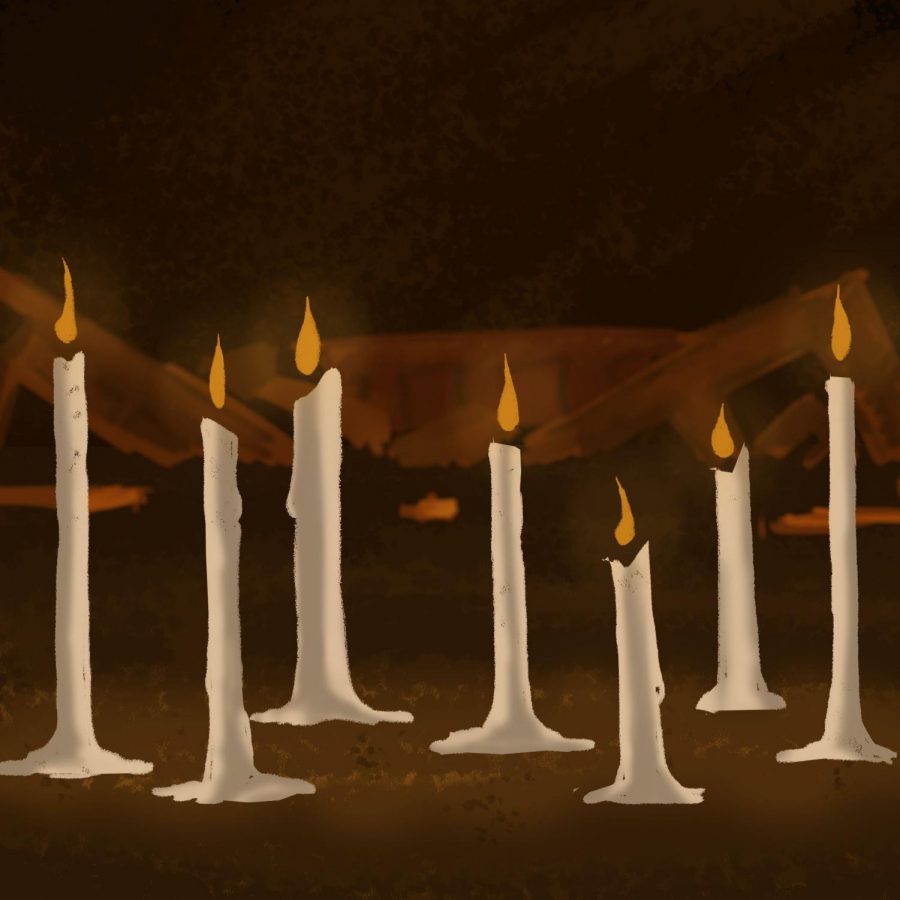The Devastating Ambush of Sri Lanka
SEARCHING FOR PEACE: In the aftermath of the Sri Lanka bombings, candles symbolize the mourning for those who perished in the attacks.
May 13, 2019
April 21, 2019, marked the day of Easter, a time of celebration for many. Many people in Sri Lanka were attending church and high end hotels. Throughout the day, nine explosions went off across the country of Sri Lanka without any warning. This was no coincidence. It was a well planned ambush on Sri Lankan soil. Once all the dust and smoke faded, the large number of casualties were clear. The country was in a state of chaos and confusion. Initially many sources reported that the death toll from the bombings was roughly around 350 people, and there were more than 400 people wounded. However, the initial findings were inaccurate. According to the New York Times, “More than 250 people were killed, including at least 45 children, and about 500 people were wounded. The victims came from more than a dozen countries, and included people worshipping at Easter services.” It is odd to see the initial death toll being off by so much.
However, with such a sudden widespread devastating attack, it may have been difficult to give an accurate estimate. According to the BBC, “Sri Lankan Deputy Defense Minister Ruwan Wijewardene said morgues had provided inaccurate figures. Another official, the head of health services, told Reuters new agency there had been so many parts it was ‘difficult to give a precise figure.’ According to the health ministry, all autopsies had been completed late on Thursday and it transpired that some victims had been counted more than once.” It seems like the people who were counting wanted to get a rough death toll out quickly to show just how large scale of an attack this was. Junior Stoss Hanssen says, “I think the Sri Lanka bombings are definitely a horrible thing that happened. It was a innocent celebration of Easter, the terrorists have no right to bomb the church.” It is difficult to process how the victims of the bombings went from celebrating Easter to running for their lives as the bombs went off across the country. Freshman Cristiana Mateas says, “I feel like it is kind of sad that bombings and shootings happen so frequent. It seems to happen every week. School shootings happen so often that you get used to it, which is a horrible thing.”
Many people are wondering who could be responsible for such a devastating attack. The bombings were spread across the country and the attacks were well coordinated. According to Reuters, “‘All suspected plotters and those directly linked to Sri Lanka’s Easter Sunday bombings have either been arrested or are dead,’ the country’s acting police chief said on Monday. Sri Lankan authorities have said the bombings were believed to have been carried out by two little-known local Islamist groups, the National Tawheed Jamaath (NTJ) and Jamathei Millathu Ibrahim (JMI). The Islamic state has claimed responsibility.” It is surprising to see how quickly the Sri Lankan authorities were able arrest all the suspected plotters involved. However, there could still be more suspects that are either on the run or unknown to the Sri Lankan authorities. Immediately after the bombings, the Islamic state quickly announced its responsibility in the bombings. Senior Andy Qin says, ”It is a publicity stunt. Part of the nature of terrorism is to inspire fear and make people scared. By claiming responsibility it makes people feel that the terrorists are more powerful and more feared than they actually are.” ISIS would never have claimed anything if there were no benefits to announcing responsibility to terrorist attacks, like this recent bombing in Sri Lanka. The motives for the bombings are still uncertain as the suspects are under investigation. Some theorize that the bombings were in retaliation to the shooting of the mosque in New Zealand since the churches that were bombed on Easter were Catholic. Mateas, says, “It was to stop Easter from happening. There should not have been lives taken. They attacked what others believe in. It is our responsibility as an society to do something about it.”
The Sri Lanka Easter suicide bombings negatively impacted the country of Sri Lanka. First, the country has to deal with the initial effects of the bombing, like the physical and mental damage done to innocent people. Hundreds of innocent people were killed and even more were injured from the blast. Sophomore Suprita Mantravadi says, “A large scale terrorist attack changes the way people view their life. A church could become unsafe in the eyes of many.” Now, the country has to deal with even bigger problems that could become long-term, like increased religious tension following the attack. According to France24, “Sri Lanka’s Roman Catholic Church appealed for calm and an alcohol ban Monday after clashes between Christians and Muslims in a town scarred by the Easter Suicide attacks. Hundreds of security forces entered Negombo to impose a curfew after dozens of Muslim-owned shops, homes, and vehicles were attacked.” Religious tensions in Sri Lanka are at an all-time high. These tensions may last for a long time if no compromises are made between the two parties. Although the motives of the attackers are unknown at the moment, the fact that the terrorists chose Catholic churches and attacked on Easter signifies a possible religious motive. Mateas says, “There are quite a few terrorist attacks that are motivated by religions. There are also a lot of attacks because of a certain prejudice. We seem to be more focused in our differences than our similarities.” What is surprising is that the Christians and Muslims make up the minority of Sri Lanka’s religions. It is interesting to see that the minority of religions in Sri Lanka are the ones with the most tension. According to the CNN, “The US Department of State says, Buddhism is the island’s majority religion, accounting for just over 70 percent of the population. The remaining minority communities are made up of Hindus (12.6 percent), Muslims (9.7 percent) and Christians (7.4 percent).” Seeing that the main targets of such a large scale attack were mainly a minority in Sri Lanka, it shows a strong correlation to a motive based on religion.



